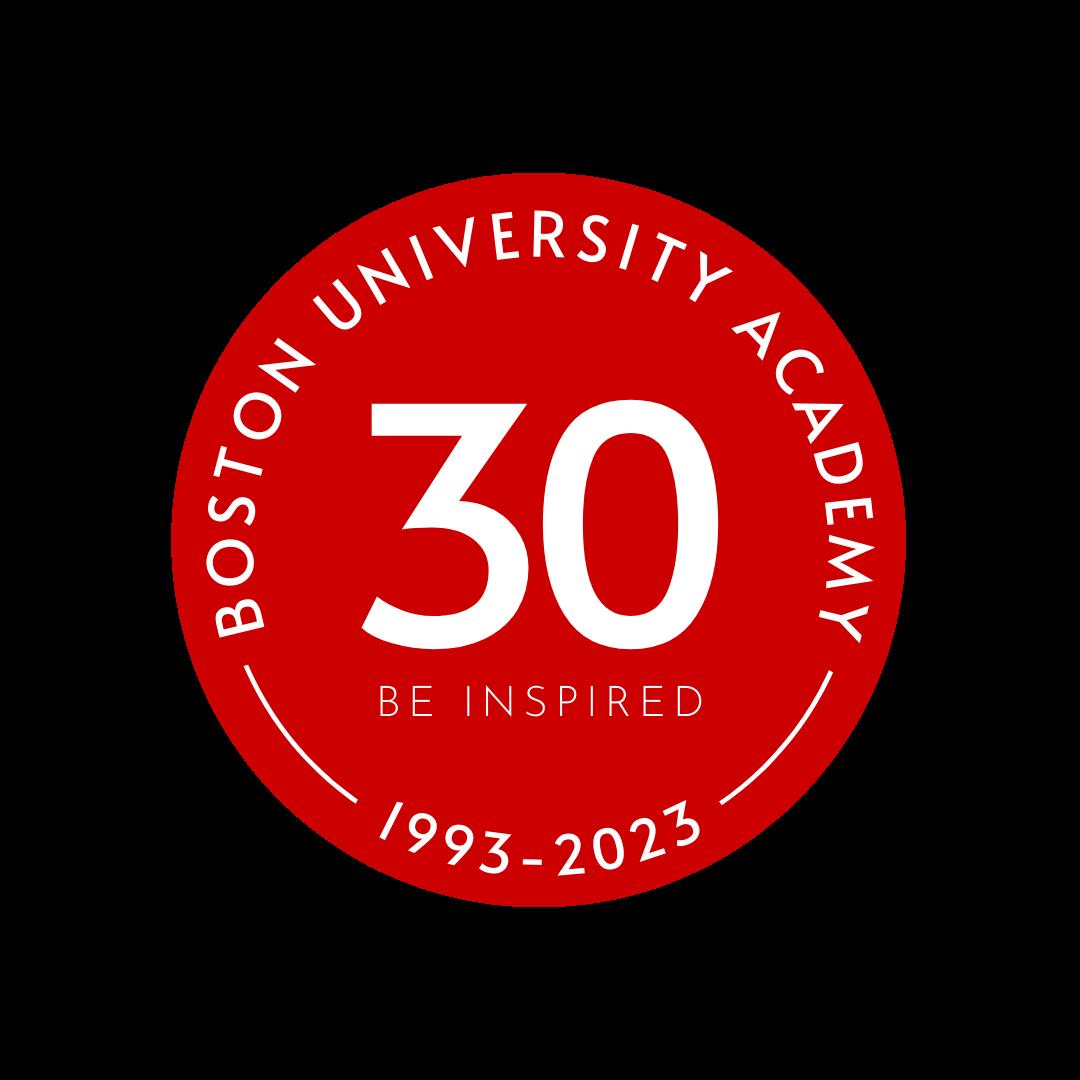ODYSSEY
The Magazine of Boston University Academy



We are delighted to share this first edition of Odyssey, BUA’s magazine. The title pays homage to the school’s classical curricular roots; Homer’s epic remains a mainstay of the 9th-grade curriculum and part of the welcome package sent to all admitted 9th graders. It also acknowledges the distance we’ve traveled as a school these past 30 years — the challenges and triumphs — and the exciting path we are charting together for the future. This spring, we will gather for our 30th anniversary gala at the Museum of Fine Arts to thank all of you who laid the foundation for this wonderful school and dream together about the years to come. We look forward to seeing many of you there!
We hope that what you read here inspires pride in what we have accomplished together. As you flip through these pages, you’ll see evidence of a BUA very much in motion: upgrades to our learning spaces; curricular changes in the humanities to reflect a more global, diverse world; a new schedule designed for students; a deeper institutional commitment to diversity, equity, inclusion, and belonging; and targeted efforts to partner with the City of Boston. You will also notice our fierce pride in those parts of the culture that have been at the heart of this great school from its earliest days: remarkable students taught by inspiring, loving teachers; unapologetically high academic standards; a community where our love for inquiry is matched only by our care for one another; a small school with limitless opportunities.
None of this is possible without all of you. From my first days at BUA, I have been struck by the generosity of spirit among students, parents, faculty, staff, and graduates — the patience, warmth, kindness, grace, gratitude, and genuine desire to give back. You have offered advice, volunteered your time, and made BUA a philanthropic priority — a major reason why we can keep BUA broadly accessible to families across the socioeconomic spectrum, support our world-class faculty, and give our students the experience they deserve. For all of that, we are grateful.
We enter our thirtieth year with confidence. What started as an intriguing experiment in the early 1990s has become the school of choice for the kindest, most curious, most capable young people in the Boston area. The wind is at our backs and our sails are full. And I feel very fortunate to be on this journey with all of you.
Warmly,
 Chris Kolovos, Head of School
Chris Kolovos, Head of School

Margo Cox
Jessica Gutierrez
Nastaran Hakimi
Chris Kolovos
Elisha Meyer
Rosemary White
Photography
Dave Green
Nile Hawver
Tom Kates
Sitarah Lakhani ‘22
Tara Teslow
Magazine Design
Tara Teslow
Cover Photo
Nile Hawver
Alumni News
Send notes and correspondence to Dave Stone at stoneyd@bu.edu
ON CAMPUS
On Kindness: Opening of Term Address from Chris Kolovos A Schedule Built for Students
Meet our New Faculty
Dr. Monica Alvarez, Director of Equity and Inclusion
Mr. Rob O’Rourke, Director of College Counseling
Adapting the Canon to a Diverse, Global World Partnering on the Path to Equity and Access 2022 BUA Commencement
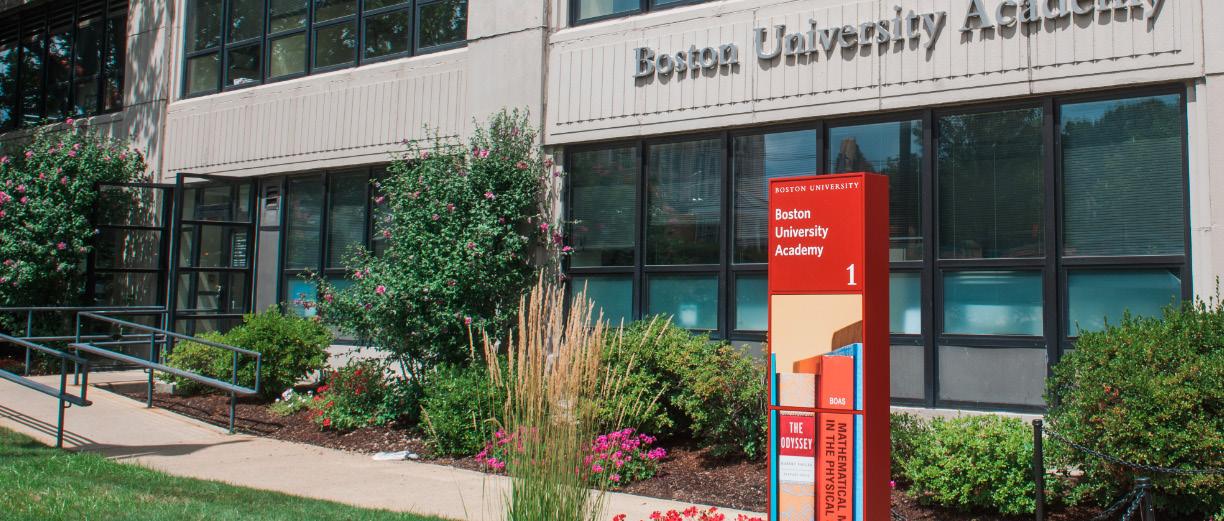
Class of 2022 Matriculation List
An Orange Sun Rises Over BUA Great Teachers Fund: Celebrating Dr. Lauren Proll IMPACT REPORT
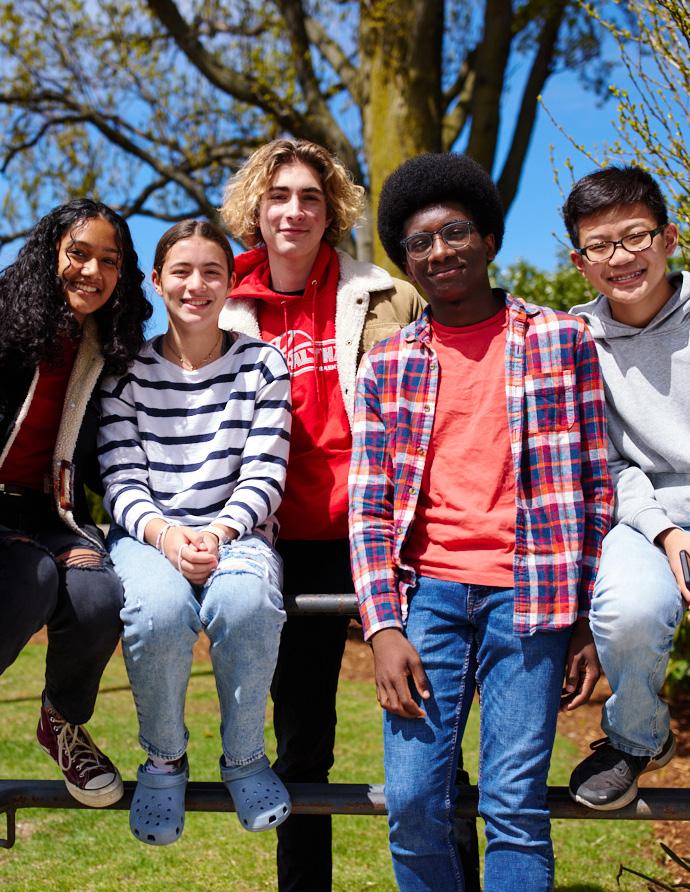
On September 6, 2022, Head of School Chris Kolovos delivered his opening address at all-school meeting.
This is a year we have all been looking forward to for some time. It is a year that promises a level of normalcy that we have not experienced in quite a while – and that you all deserve. In just a few days, we will lean back into our traditions, with a group of us heading off to Camp Burgess for the first time since before the pandemic.
It is also a special year for another reason. This marks the 30th anniversary of this school’s existence. It is a chance for us to think back on the legacy we have inherited from the teachers, staff, and students who have come before us and a chance to dream about the future that we will build together.
In a few moments, I will welcome Lizzie Seward, our Student Council president, up to offer a few words of welcome. But before we do that, I’d like to offer some thoughts as we start the term together, as I do at the start of each of our terms.
My talk this morning is prompted in part by my son, Charlie, whom many of you have heard about; if you have not, you will hear plenty over the next few years! He is two years old. Every morning, this is his routine: he comes downstairs and, before demanding his milk, he insists on seeing his toaster. Now, mind you, this is not an actual kitchen appliance. It is a toy toaster we bought from a Greek online toy store. If you press a button, it announces what kind of toast it’s making – how dark or how light the toast should be; whether there’s peanut butter or marmalade or honey on the toast. I’m not sure why he loves this toy; it’s a really strange little thing. But he loves it. Before he starts
his day, he has to go to “Toaster” and ask him if he had a good sleep. “Toaster, have you had a good sleep?” My wife and I smile every morning when we hear that. As I think about it, the reason is because it gives us hope that we are raising a kind person.
This morning I want to talk about kindness. It is a word that we use a great deal around here, and for good reason. We talk about a kind and curious community made up of kind and curious people. I am justifiably proud that those things are true, especially because they are deeply countercultural in a world that is focused so much on achievement, getting ahead, and, increasingly, incivility. But it is a touchstone for us here at BUA. And I think it’s worth exploring together. So I’ll offer just three ideas this morning about kindness.
Take a moment to think about a time when somebody was kind to you. Think about where you were; think about what they did; think about how it made you feel. Some of you might notice a little warmth in your chest. You might be cracking a half smile.
Kindness is not just sympathy or empathy, although those things may well be required for true kindness. Nor is it being nice. There is a superficiality about being nice. Kindness is different. Kindness is action. It is a choice we make. It is a choice we make to do something that inspires a positive feeling in another human being — often with no benefit to ourselves, sometimes with a cost to ourselves.
At times, being kind is easy. It is easy in those moments when we are relaxed, or when we are interacting with somebody who is close to us or somebody we love. At other times, though, it is harder. I think about a day, like today, which promises to be pouring. I imagine some of you being late to your BU class and still making the decision to hold the door outside the GSU for somebody you do not know, with nobody around you to witness it and give you credit. You choose to hold the door anyway. Those small moments become habit. It is in those small moments when character is built. Those are the things we expect from you when we talk about being kind.
Earlier this summer, I was at Trader Joe’s. I was in a rush. I was a little nervous because of COVID: it was crowded, and I have a young family. I was wearing my mask, it was hot, and I was
“Kindness is action. It is a choice we make. It is a choice we make to do something that inspires a positive feeling in another human being – often with no benefit to ourselves, sometimes with a cost to ourselves.”
impatient. As I turned the corner from the produce section to the refrigerator section, I saw an old woman reaching up for a package of sliced cheese near the top of the refrigerator section. I felt disgusted by the people standing around her not helping. I paused there feeling self-righteous and angry, and then intensely stupid for not doing the thing I should have done from the beginning, which is to go over and help her. That’s what I did. As I began to walk away, she turned to me, took my arm, and asked, “Can you do something for me?” I said, “Sure.” She said, “Please tell your mother that she raised you well.” I still have not told my mother – I should. But I will tell you this: I had a much better day after that moment with the old woman at Trader Joe’s.
There is something physiological — something chemical — about kindness and its effect on us. Some of you might have studied this in your classes. Being kind has been shown to produce elevated levels of oxytocin, dopamine, and serotonin. It can decrease blood pressure. It leads to something that is more colloquially called a “helper’s high.” We have evolved this way, researchers think, in cooperative and altruistic communities.
of the cloth. I was reading one of his talks recently, and he included this passage: “I have been present at a number of deaths. I’ve never yet heard a dying
kindness. The studies show that when people observe others being more generous, more loving, and more kind, the observers adopt similar behaviors.
But there are more than just short term benefits that come from kindness. Those of you here last year may remember me talking about my old headmaster, Mr. Jarvis, who was a man
man or woman brag about how much money he made or how successful she was. My experience is that a dying man looking back on his life is proudest to have helped people, of having used his time and talents to do something for others.” To do something for others. Kindness produces not just an immediate benefit, but also long term fulfillment and purpose.
Many of you know that I love and admire Mr. Rogers, who was a longtime host of a children’s program on PBS. One Sunday evening, my wife and I watched “A Beautiful Day in the Neighborhood” starring Tom Hanks about the life and times of Mr. Rogers — a man who is the closest thing to a saint we have seen on television. I came to work the next morning in a much better mood, much more patient, and a much better listener. I simply wanted to be a better person because of the model that he set.
There is real science too — dozens of studies from social psychology — supporting the idea of a contagion effect of
Those actions create ripples in a community. Think about the line of cars at a drive-through when somebody pays for the car immediately behind them, and then that process continues sometimes for minutes, sometimes for hours. It is that kind of ripple that I see in this community — in all of you.
You have heard me recite this adage before, but it bears repeating: “From those to whom much is given, much is expected.” You all have been given so much, not the least of which is the education that you have received and you will receive here. We appropriately expect a great deal from you. I ask you to find a way today, this week, this year to do something that is within all of our means: be kind to another human being. Maybe that means helping a new student find her way when she’s looking for the black box theater. Maybe it’s holding the door. Maybe it’s reaching out to somebody at lunch who looks like they could use a friend. Find a way to make somebody else’s day better and create those ripples throughout our community. Thank you very much, and have a wonderful school year.

“From those to whom much is given, much is expected...Find a way to make someone eles’s day better and create those ripples throughout our community.”

For too long, schools have defaulted to schedules that reflect the priorities of a factory model, ignoring what decades of research tells us about teenage brain development, student health, and the preconditions for deep, sustained learning. Outdated schedules have driven pedagogical choices, when the reverse must be true. Students deserve a schedule designed for them.
In the fall of 2021, BUA took action, moving to a new academic schedule. The new schedule incorporates two main innovations: a late start every day, and fewer, longer class meetings per day — all while preserving teaching time and chances for students to connect with teachers outside of class.
Pediatricians and experts on adolescent development have been telling us for years that the teenage brain tends not to “wake up” until later in the morning and that adolescents need between eight to ten hours of sleep per night. With all of the competing pressures on kids, sleep is the first thing to go. According to the CDC, seven out of ten high schoolers do
not get enough sleep, and, on average, high schoolers sleep for about six-anda-half hours per night. This should be a wake-up call.
The BUA school day begins at 8:55 a.m. on Mondays and Fridays and at 8:30 a.m. on Tuesdays, Wednesdays, and Thursdays. Students use the later start in different ways. Some sleep in a little longer. Some use the morning time to get homework done and go to bed a little earlier the night before. Others may come to school early to meet a teacher or work with classmates. As one teacher observed, “the later start time seems to fit with students’ natural rhythm. They seem more alert and awake in A-block classes.” Whatever the students’ choices, we are confident that the result is healthier kids and better learning.
BUA classes meet three times per week for longer periods, rather than four times for shorter periods — the pre-pandemic norm. That means that most students have three classes on some days and four classes on others.
The change has had a dramatic and positive impact on the lives of our students. Reducing the number of classes students have to prepare for each night allows them to end the day with a sense of completion and mastery — a predictor of mental health and happiness. Rather than scrambling to finish their assignments and cross things off the list, they have the time and space to focus on the three or four things they need to do for the next day. And we are seeing a deeper engagement in the classroom as a result. In a survey to solicit feedback on our new schedule, one student wrote, “The distancing between classes means students can better manage the heavy homework load, allowing us to build and use skills to manage it.”
The research is instructive here as well. Psychologists tell us that one of the key drivers of unproductive stress is having more on your plate than you can handle. Research from The Higher Education Research Institute at UCLA and the American College Health Association show shocking increases in the numbers of students reporting depression,
One teacher observed that “the later start time seems to fit with students’ natural rhythm. They seem more alert and awake in first period classes.”
anxiety, eating disorders, and feelings of being overwhelmed. Increasing the resources we devote to mental health support and education for students is necessary, but not sufficient. A change like this helps us address the root of the problem, even as we create opportunities for deeper learning.
That deeper learning is more likely to happen in longer blocks. Each BUA class meets for 60 minutes twice per week and 75 minutes once per week. Longer class periods are a good fit for the kind of deep, engaged learning that BUA is known for. The longer periods allow a conversation around the seminar table to continue, rather than being cut off at the 50-minute mark; they facilitate the hands-on work in the arts and in science labs and the inquiry-based approach to math that sets BUA apart from its peers; they allow teachers to do what they have always done — just better; and the longer blocks open the door for innovative pedagogy and projects not possible in the traditional 50-minute period. A BUA sophomore stated, “I really like long blocks because we are able to learn a lot more during the class! Also, I find that there is ac-
tually less work assigned for classes on long block days because more work gets done during class!”
We think a great deal about respecting tradition and driving innovation. In this case, the innovations are designed to protect and amplify those things we hold most dear.
The new schedule maintains our commitment to maximizing the time students spend with teachers. With fewer, longer classes, there are fewer transitions during the day — less time settling in and packing up — and a net gain of productive class time. It protects cherished common free time between teachers and students. We know that some of the most important learning happens in the quietest moments — when a student seeks out a teacher one-on-one to review a piece of writing, to follow up on a conversation in class, or just to solicit advice about life. One of the great advantages of being at BUA is the ability to take BU classes, mainly in the junior and senior years. We have designed the new schedule to ensure that students in both BUA and BU
classes will have ample time to transition from one to another and to provide the broadest possible flexibility for students to enroll in BU courses.

There is also a lesson here about the pandemic and crisis planning. Driven by both necessity and the desire to experiment during the height of the pandemic, we lived a schedule where some school days began later in the morning; where BUA classes met less often; and where some blocks were longer than normal. We designed the new schedule to incorporate the best of those pandemic-inspired changes while returning to several of our most cherished commitments.
We make these changes to serve our students. There is a false choice between social-emotional health and rigor. An evidence-based approach like this one can promote healthy sleep habits and help students manage stress while, at the same time, putting students and teachers in a position to increase the rigor, engagement, and stimulation inside and outside the classroom.
Dr. Harrington comes to BUA from Phillips Academy Exeter, where he was one of three John and Elizabeth Phillips Dissertation Year Fellows in the 2020-21 academic year. He holds three degrees in English: a PhD from the University of New Hampshire, an MFA from the University of Central Florida, and a BA from the University of South Florida. He is most interested in literary theorists who study gender, sexuality, and nationality, as well as in works of graphic narrative, memoir, and contemporary essays.
Mr. Seth comes to BUA after two years at Phillips Academy Andover, where he furthered a passion for helping young people through care, generosity, and most importantly, math! He is originally from North Carolina, and completed his undergraduate degree at Yale in 2020. There, he majored in biochemistry while also exploring interests in mathematics, literature, and linguistics. In his free time, he is a practiced volleyball and spikeball player, a cook of vegetarian dishes, and a lover of novels.



Ms. Tam is a proud alumna of Wellesley College, where she earned a major in political science and a minor in history. While at Wellesley, she was a fellow with the Madeleine Korbel Albright Institute for Global Affairs and received an Undergraduate Fulbright Summer Institutes Award. Originally from Sudbury, MA, Ms. Tam moved to California in 2015 to pursue her MA in political science at the University of California-Berkeley. Ms. Tam began her teaching career in 2018 as a history teacher at Pacific Ridge School in Carlsbad, California. In her spare time, Ms. Tam enjoys listening to audiobooks, playing board games, and attending as much live theater as she can.
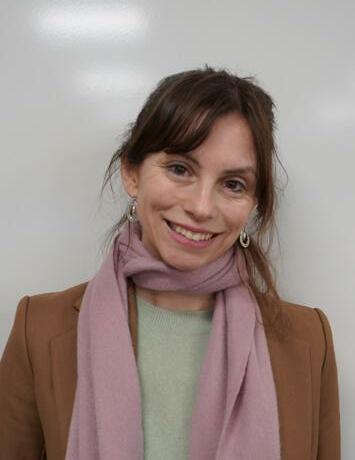
Ms. Kelly graduated with a BA in literature from Yale University, and with an MFA in creative nonfiction from the Bennington Writing Seminars. She taught English and creative writing for twelve years at the Harvard-Westlake School in Los Angeles, and for the past two years at the Middlesex School. She is also a working writer, publishing essays, reviews, poems, and books. She is currently completing a memoir.

Mr. Vitali joins BUA’s history department in a yearlong teaching appointment.

Previously, Mr. Vitali taught at Judge Memorial School in Utah and Damien Memorial School in Hawai’i. He earned his BA in history at the University of Portland. Upon graduation, he received the James T. Covert Leadership in History award.
Ms. Rowny has been teaching middle and high school math for twelve years, having previously taught at Hopkins School in New Haven, CT and at Blair Academy in Blairstown, NJ, where she served as the department chair. She holds a BA in mathematics from Kenyon College and an EdM in learning and teaching from the Harvard Graduate School of Education. Ms. Rowny is particularly interested in creating student-centered, discovery-based classrooms and supportive teaching communities. In addition to thinking math is flat-out cool, she also believes we can learn a lot about ourselves through solving complex problems. She likes to bring these skills to bear outside of her teaching life by doing puzzles and playing video games.
This year, BUA English teacher Dr. Monica Alvarez has stepped into the newly-created Director of Equity and Inclusion role at our school.
Dr. Alvarez came to BUA following fourteen years at Trinity School in New York City, where she taught English and helped lead that school’s DEI efforts as Equity & Inclusion Coordinator. Since arriving at BUA in the fall of 2021, Dr. Alvarez has been an inspiring teacher for ninth-and tenth-graders; a trusted advisor and club leader; and co-chair of the student-faculty Diversity, Equity, and Inclusion Committee. She will continue to teach ninth-and tenth-grade English alongside this important leadership role.
Dr. Alvarez offered the following reflection about her new responsibilities:
“Two of my favorite things at BUA are the deep mutual appreciation and genuine care that shape so many of the interactions among its members. This year, I am looking forward to discovering the ways in which BUA can nurture this appreciation and care into a sense of belonging: of joyfully co-creating a learning space that spills beyond the walls of the classrooms and encourages its members to fully show up, knowing we inhabit a space where we are seen for all that we are. What an exciting time lies ahead!”
As BUA’s inaugural Director of Equity and Inclusion, Dr. Alvarez will work across constituencies — students, faculty, staff, parents, alumni — and lead the school’s efforts to fully live up to our core values of community and inclusion. The work will touch on many areas of school life: student support, parent engagement, admissions, professional development, curriculum, pedagogy, hiring, and others.
In creating the position, Head of School Chris Kolovos noted, “I am proud of our school’s commitment and progress around diversity and inclusion. The rich diversity of our student body is one of the key reasons for our excellence. We stand out among our peer schools for being a place where all kinds of young people can feel at home and part of the BUA family. We have taken great strides in making BUA more accessible and our policies more fair. But the work is never done. I am so grateful to Dr. Alvarez for taking on this role at this pivotal moment. She loves and understands BUA, having gained an appreciation for what makes us special. She also has a deep respect for community voice and instinct for building consensus. She is in an ideal position to help us nourish our traditional strengths, identify areas for improvement, and move forward together.”
He went on to stress, “DEI is not one person’s job. It is the work of the entire community and only succeeds when we are all involved. I know the BUA family will embrace Dr. Alvarez in this new role, and I look forward to partnering with her for years to come.”

“DEI is not one person’s job. It is the work of the entire community and only succeeds when we are all involved.”

Rob O’Rourke joined BUA as the Director of College Counseling in July 2022. He comes to us from Groton School, where he served as Associate Director of College Counseling since 2014. Before Groton, Mr. O’Rourke was a Senior Assistant Director of Admissions at Georgetown University, playing a central role in that institution’s undergraduate admissions program and gaining experience that has informed his subsequent work with high schoolers. Rob shares the following note on his hopes for the college counseling process at BUA:
“What a privilege it is to have the opportunity to support BUA students as they consider the next steps in their academic journey. They are kind and curious, yes — but they are also bold, creative, thoughtful, and just plain fun!
We want students to take ownership of their college process — they are already independent as they navigate BU’s campus, so we want them to feel a sense of autonomy as they embark on a journey that is ultimately about their dreams and aspirations. We want students to explore the possibilities ahead of them with open minds and we equip students with the tools and resources to make educated choices. Leveraging thoughtful self-reflection and careful research, we want students to identify college and university matches that align with their values and goals.
BUA students bring particular strengths to the college process. They stretch the boundaries of their learning at BU and in laboratories, digging into their academic passions with depth and sophistication. They understand what it is like to engage in college-level coursework, so they are well-positioned to articulate what is important to them as they think about their next steps. And they build meaningful relationships in our small community at BUA with mentors who support and encourage them. All of this positions BUA students to approach the process with confidence.
We work with students intensively at every stage and help them craft applications that reflect their authentic selves. While we know the process can seem daunting, we believe that when we work collaboratively and approach each phase with curiosity and joy, students will feel a sense of accomplishment and pride as they move on from BUA.”
Ms. Jessica Jackson, Associate Director of College CounselingJessica earned her BA in mathematics and adolescent education from Elmira College. After graduating in 2013, she moved to southern California to work in admissions at Claremont McKenna College. Having seen the curtains pulled back on the highly selective college admission process, Jessica moved to the other side of the desk as a college counselor at Milken Community School in Los Angeles.
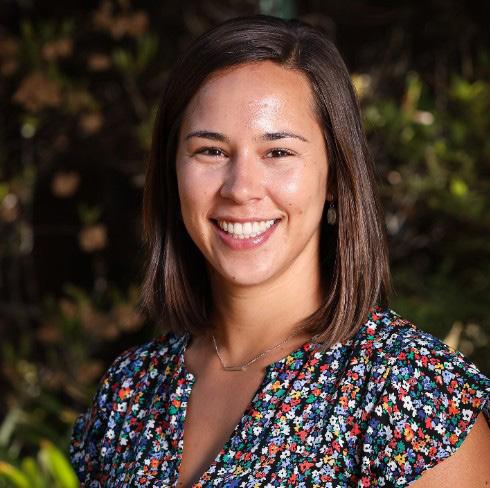
As a result of the vision and hard work of our faculty this spring and summer, and inspired by conversations with our students over the years, our ninth and tenth-grade students are engaging in a revised history and English curriculum this year.

Our humanities program at BUA has been, since our founding, one of our great strengths. Our mission highlights our promise that, at BUA, students will “read deeply” and “think critically.” Those ideas permeate the English and history classrooms. History students dive into primary sources, eschewing schools’ traditional reliance on textbooks and challenging students to engage with language and ideas that push their intellectual ability. In English, students likewise read challenging, rigorous texts that one would expect to see on a college syllabus. In both departments, students test their ideas with one another in conversation around a seminar table, often staying after the bell or carrying those discussions into the hallway. Our graduates often tell us that they learned to write at BUA, a skill that only comes with practice and mentorship, which our inspired and inspiring teachers have provided for decades. All of those features will continue.
We are also proud of BUA’s traditional focus on the Western humanistic tradition, where students have the opportunity to ask some of the most basic questions of human existence in conversation with the Western literary canon and giants of Western philosophy: Why am I here? What is my role in society? What does it mean to live a good life? These are questions that our students are naturally asking. The curriculum has provided a vehicle for that exploration and will continue to do so.
There are limitations to this approach. It can give the misimpression that the Western tradition is the only or a superior
source of wisdom. It may not provide opportunities for our increasingly diverse student body to see themselves reflected in the literature and history they study. And it may sacrifice knowledge that is essential to our students as they prepare to be citizens and leaders in an increasingly global world. We have heard those concerns from our teachers, students, and graduates — all of whom value our traditional approach and see the need to address the limitations.
The path our teachers have chosen going forward preserves the richness of our traditions while injecting a global and diverse outlook. Courses are organized around themes, many of which carry over across disciplines and all of which have deep relevance for our students’ lives in the 21st century.
The work is ongoing; any curricular reform must be. But we are confident that these changes represent an important step forward that, at the same time, maintains those things that have made our approach so powerful over the years. We are deeply grateful for all the students and graduates who have shared their thoughts and helped inspire this change. And we are most grateful to our teachers, who spent their summers working to offer our students this exciting curriculum.
We continue our exploration of Greece and Rome but add a deep dive into Chinese dynastic history and philosophy. In the process, students investigate ideas of good government and the meaning of a good life.

Students still read mainstays of the literary canon, but also put those texts in conversation with rigorous, rich texts outside that tradition. They read Homer’s Odyssey, for example, alongside Toni Morrison’s Song of Solomon; Jane Austen’s Pride and Prejudice alongside Mohsin Hamid’s Exit West — exploring common themes around identity, the boundaries between self and community, and our understanding of heroism and virtue.
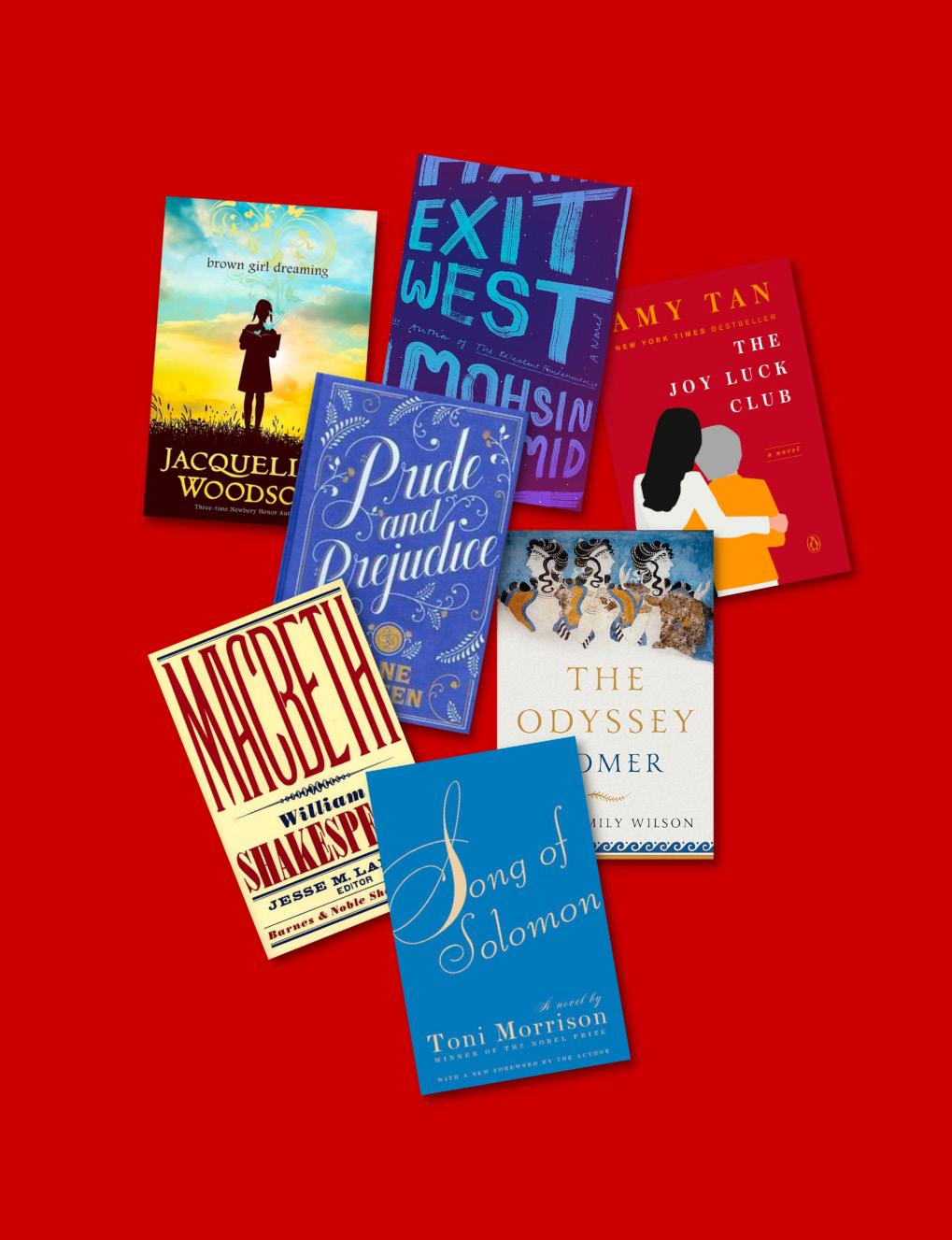

Our students continue to engage with some of the great canonical works of British literature
— Beowulf and The Canterbury Tales — while broadening the aperture to include postcolonial literature from the English-speaking world, like Chimamanda Ngozi Adichie’s Purple Hibiscus and Jhumpa Lahiri’s Interpreter of Maladies. Thematically, they trace the evolution of literature in the English-speaking world and use that as a lens to explore what it means to live in an increasingly global world.
Students continue to read the great philosophical works of the European Enlightenment but pair that with a similarly rigorous investigation of topics we believe they will need as global citizens: the Islamic world; pre- and post-colonial African history; and the 20th-century world, including a focus on the Holocaust. In so doing, they address abiding questions: the relationship of faith to the public sphere; the development of the concepts of human rights; and the moral obligation of a citizen to the community.


As part of a sustained partnership between our two organizations, BUA recently hosted roughly 80 students from Alexander Twilight Academy for its six-week summer program. Named for the first Black American to graduate college in the United States, ATA is a free academic catalyst program serving promising middle school students from under-resourced backgrounds, most of whom live in the City of Boston.
Through afternoon programming during the school year and intensive work in the summers, ATA “prepares middle school students to earn admission to and thrive at the nation’s top high schools” and makes a commitment to serve those students and families through college and beyond. The summer program is just one aspect of this mutually beneficial, mission aligned partnership.
In the 2021-2022 school year, BUA and ATA joined forces to launch a one-onone tutoring program pairing BUA and ATA students for weekly virtual academic tutoring sessions in language arts, math, and coding.
During the current school year, BUA teachers and students look forward to hosting ATA students on campus for educational enrichment opportunities. Our admission office is also extending support for the program’s first 8th-grade class. As ATA 8th-graders embark on the high school application process, BUA will host financial aid workshops for ATA families, offer interview preparation sessions, and host students on campus for entrance exams.
And this is just the start. We envision ATA students enrolling at BUA one day soon; BUA alumni serving as college and career mentors to ATA graduates; BUA students interning with ATA’s summer program; joint professional de-
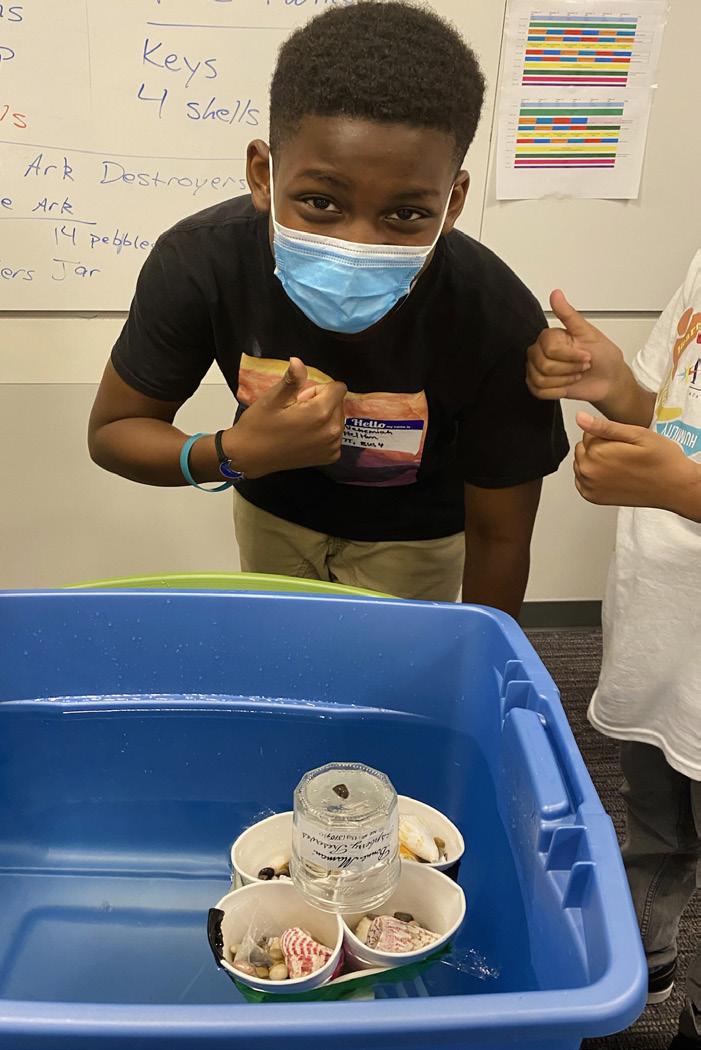
velopment and conversation with our teachers; and more.
Partnering with ATA is a way for BUA to amplify our impact and live into our promise to be a private school with a public purpose — playing a small role in launching these ATA students and setting them on their path. More broadly, we see this as another step in becoming a school in and of the City of Boston.
How can our connection to Boston help us live out our mission commitment to excellence and access? How can we use the city as our classroom? How can it inform our curriculum? What opportunities are there for place-based learning and internships? What can we be if we fully embrace the first word in our name: Boston.
What can we be if we fully embrace the first word in our name: Boston.
On Monday, May 23, Boston University Academy hosted its 28th commencement exercise at BU’s Tsai Performance Center. The 45 members of the BUA Class of 2022 crossed the stage to receive their diplomas from Boston University Provost and Chief Academic Officer Jean Morrison and BUA Head of School Chris Kolovos.
Reverend Dr. Ray Hammond and Gloria White -Hammond, co-pastors of the Bethel African Episcopal (A.M.E.) Church, jointly delivered this year’s Commencement keynote address. The Hammonds co-founded Bethel A.M.E. Church in Boston’s Jamaica Plain. The son of a Baptist preacher and a school teacher in Philadelphia, Rev. Ray Hammond attended public schools before earning degrees from Harvard College and Harvard Medical School. He later earned a master’s degree in religion, focusing on Christian and medical ethics, from Harvard Graduate School of Arts and Sciences. Rev. Hammond is co-founder and chairman of the Ten Point Coalition, an ecumenical group of Christian clergy and lay leaders mobilizing the Greater Boston community around issues affecting Black and Latino youth.
Rev. Gloria White-Hammond is a retired pediatrician from the South End Community Health Center. She is a graduate of Boston University (BA); Tufts University School of Medicine (MD); and Harvard Divinity School (MDiv), where she currently serves as the Resident Practitioner in Ministry Studies. She is also co-founder and executive director of My Sister’s Keeper, a women-led humanitarian and human rights initiative that partners with diverse Sudanese women in their efforts toward reconciliation and reconstruction of their communities.
In their keynote address, trading turns with their remarks, Rev. Hammond and Rev. White-Hammond drew on their own formative experiences — Ray Hammond leaning on the support of his peers, despite being one of the few African-American students at his Philadelphia high school, and then later in college and medical school; Gloria White-Hammond finding support from a professor during a rocky first undergraduate semester at BU — to emphasize the importance of supportive community.

It was our privilege and honor to host Ray and Gloria Hammond as this year’s commencement keynote speakers, and we are grateful for the warmth, humor, and words of wisdom they shared with our graduates and assembled guests.
“On this day we celebrate the immense joy you have brought to all of our lives, and the high hopes that we have for you and for your future. This is your day, because it could not have come to pass without your individual commitment to hard work and sacrifice. And this is our day, because it could not come to pass without the gift of collective support from the people gathered around you today.”

This fall, BUA’s newest alumni are embarking upon the next step of their journeys at college and beyond. From California to Canada, down the block and across the Atlantic, and many places in between, the BUA Class of 2022 is making its mark on the world. Graduates — don’t forget to send us a postcard, stop by for a visit when you’re in town, and remember, you’ll always have a home at BUA!


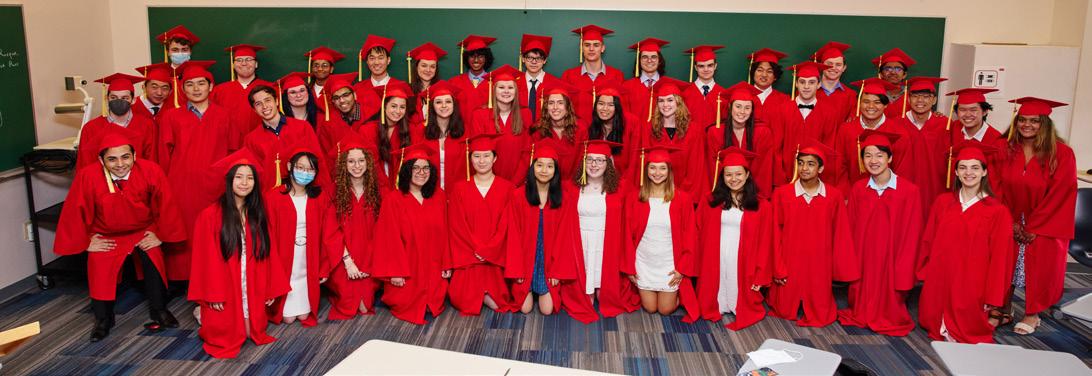
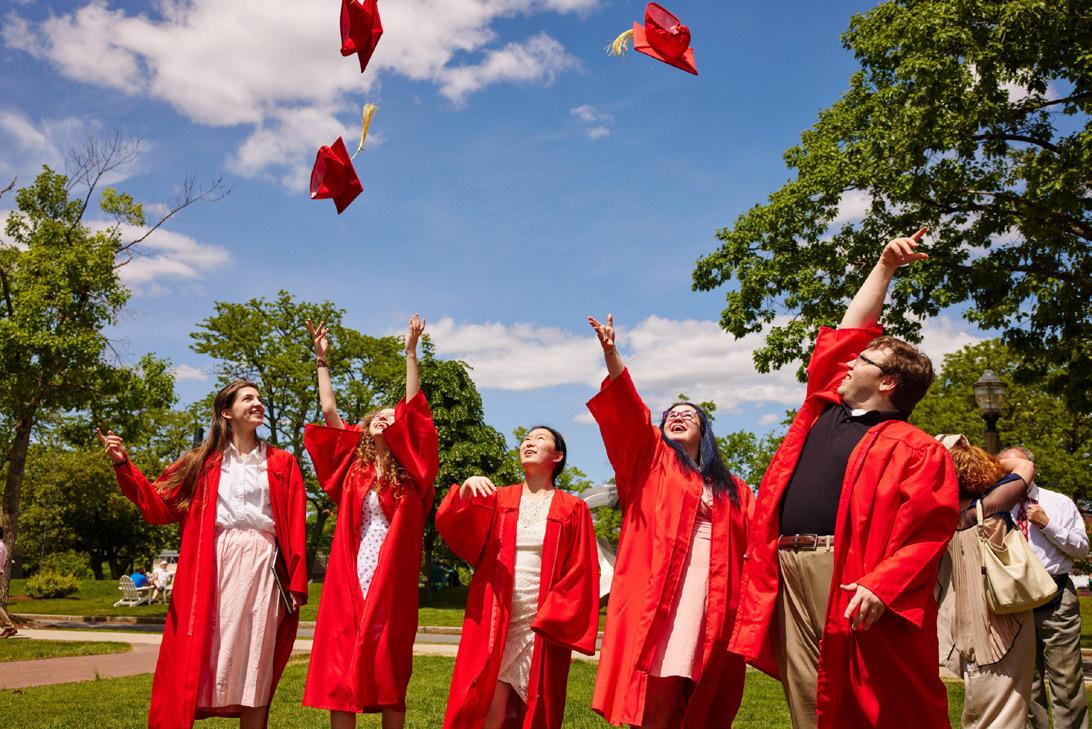
Members of the the Class of 2022 are attending the following institutions:
Boston University
Bowdoin College
Brown University
University of Chicago
Colorado College
Cornell University
University of Florida
Hamilton College
Harvard University
Massachusetts Institute of Technology
University of Michigan-Ann Arbor
New York University
Northeastern University
Princeton University
Queen’s University
Rensselaer Polytechnic Institute
Rhode Island School of Design
University of Southern California
Tufts University
University of Warwick
Yale University
This summer, a blazing orange sun rose over BUA — the BUA back lot, that is. A vibrant, celebratory, and inclusive mural was painted on the 4,000-square-foot exterior wall of Sargent Gym, adjacent to the Bridge Lot and visible from the BU Bridge, Storrow Drive, the Massachusetts Turnpike, and from many points along Commonwealth Ave.
The mural is the brainchild and passion project of recent BUA graduate Sitarah Lakhani ‘22, who conceived of this project as a sophomore. After years of persistence and hard work, her vision has finally come to fruition. Many hands made light work of the installation, as current students, alumni, and teachers pitched in to help paint — scaling scaffolding, braving the aerial scissor lift, and bearing the searing July heat to add their brushstrokes to this massive undertaking.
The mural was created and installed by Sitarah, with mentorship from muralist Amanda Hill and support from Boston University Academy and the BU Arts Initiative. Funding for the project was secured by Sitarah through private donations. Her vision? Transforming a 4,000-square-foot blank wall into a vibrant, uplifting, and celebratory piece of public art.

“I wanted to make the space beautiful. My bright and lively design showcases the women of the BU community with a special nod to those in the fields of STEM while incorporating elements of nature found nearby. The waves in the mural represent the Charles River Campus, and are mathematically generated and perfectly in scale with the wall.”
— Sitarah Lakhani ‘22, MuralistPhoto Courtesy of Sitarah Lakhani ’22
Longtime BUA English teacher Dr. Lauren Proll retired from full-time teaching at the end of the 2021-2022 academic year. On June 4, 2022, over 100 alumni, past parents, students and current and former faculty and staff gathered at the BU Castle to celebrate and thank Lauren for her many years of love and dedication to BUA. The overwhelming turnout was a testament to Lauren’s lasting impact on her students, advisees, and their families.
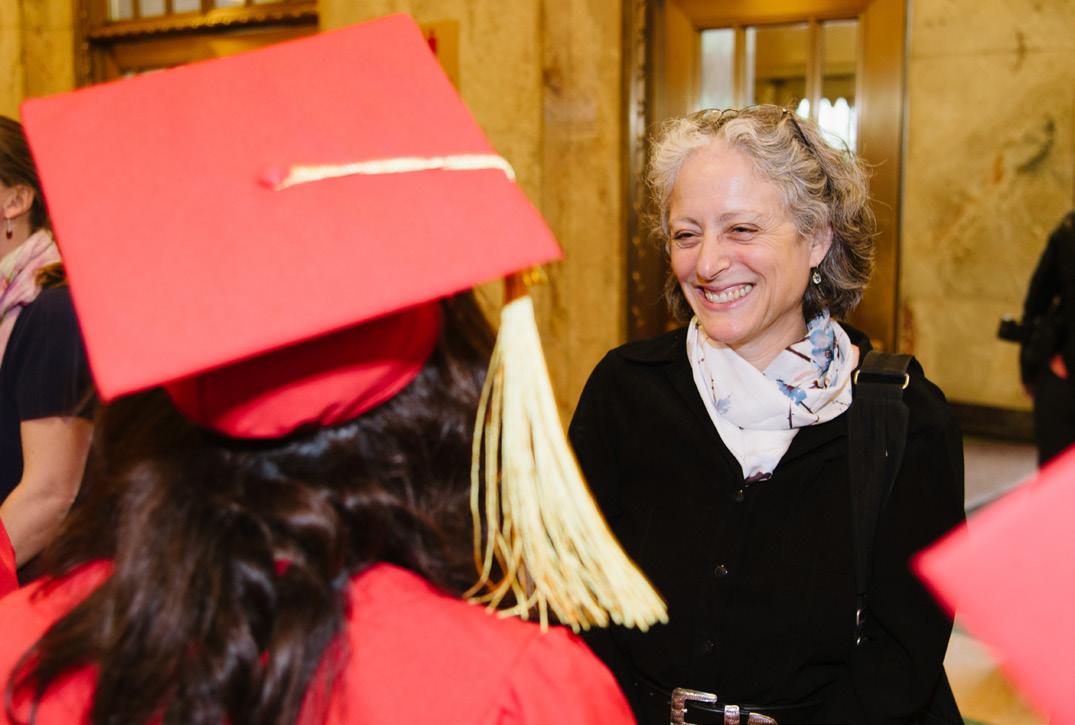

Victor Kamenker ‘13 shared a tribute to Lauren, remarking:
“On behalf of the hundreds of BUA students whose lives you have touched over the years, I would like to thank you for your unwavering commitment to your students and to their dreams. You were and continue to be an extraordinary influence for so many. I wish you all the happiness in the world as you embark on this next journey, like Beowulf returning to rule Geatland in peacetime. I hope that, unlike Beowulf, you will not encounter any fiery dragons along the way — but if you do, I will happily join in the fight.”
Lauren Proll will be honored as part of the the Great Teachers Fund. The Boston University Academy Great Teachers Fund honors retired teachers by supporting current faculty members’ efforts to improve their teaching and their students’ experience. Income from the fund underwrites, inter alia, the cost of faculty professional development and stipends for curricular revision in ways that are aligned with BUA’s strategic priorities.
The Fund was established as a permanent endowment with a gift from Ruth A. Moorman (CAS ’88, Wheelock ’89, Wheelock ’09, Par BUA ’15) and Sheldon N. Simon (Par BUA ’15), parents of Sarah Simon ’15, in honor of Phil Gambone, and in celebration and commemoration of BUA’s 25th anniversary year. Liz Cellucci, Rich Horn, and Gordon Harvey are also members of this esteemed group.


Every dollar we raise stays with BUA. The lion’s share of funds raised supports:
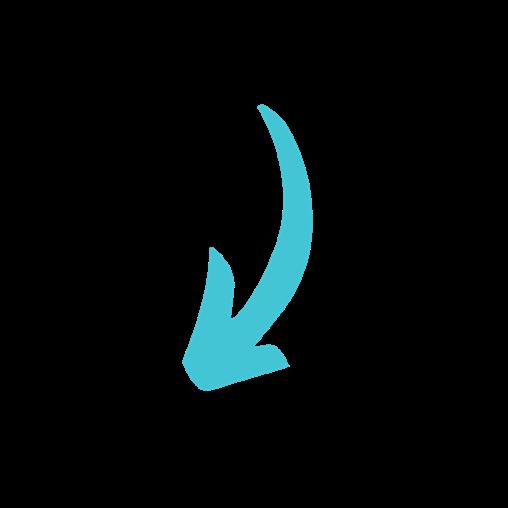
Financial aid
Professional development
Curricular innovation
Diversity and inclusion
Facility upgrades
TOTAL GIVING
$1,042,447
ANNUAL FUND GIVING
$875,578
GROWTH OF BUA‘S ANNUAL FUND OVER THE PAST 10 YEARS
Every effort has been made to ensure the accuracy of this report. If you find an error, we apologize and ask that you please notify Margo Cox in the Institutional Advancement Office (margocox@bu.edu).

100% FACULTY & STAFF
23% ALUMNI
90% PARENTS & GUARDIANS
412 TOTAL DONORS
Nearly $2.5 MILLION TOTAL AID GRANTED AVERAGE AID AWARD $39,700
30% OF BUA STUDENTS receive financial aid
“BUA’s thoughtful and holistic approach to financial aid awards has made it possible for our daughter to attend a school she loves and at which she has thrived. When the economic impact of the COVID-19 pandemic severely impacted our incomes, BUA came to the rescue with emergency relief and allowed us to keep our daughter enrolled, a kindness we will never forget.”
– BUA Parent
Thanks to the generosity of our donors, BUA made major facilities improvements to our classroom spaces over the past two summers. All classrooms have new, modular furniture, giving teachers the ability to change the arrangement to match the day’s pedagogical approach; new paint and window shades; and new ceiling tiles and energy-efficient LED lighting.


Our classrooms now give our teachers the tools they need and reflect the excellence that’s happening within.

The BUA Senior Class Gift is coordinated by the Senior Class Gift Representatives, in partnership with the Alumni Office. The BUA Class of 2022 designated the funds from their class gift to create a plant display in the east stairwell of the Academy building. Dr. Jennifer Formichelli took care of the plants there, so this gift serves as a tribute to her and a wonderful way to liven the space.
Mell Aguiar -
Class Rep
Celeste Alcalay
David Ansaldi
Aditya Bachina
Dorothy Brown
Chad Cao
Julia Dickinson
Katie Kara’a
Alice Khomski
Aidan Kim
Sabrina Kogan
Sitarah Lakhani -
Class Rep
John Lehman
Audrey Lin
Abhi Lingareddy
Winston Liu
Sarafina Madden
Suzie Marcus
Charlie Minney
Tanay Nambiar -
Class Rep
Cece Noel
Mark Polkovnikov
Robbie Repenning
Mia Shapoval
Casssandra Swartz
Jonathan Trieloff
Sasha Tyutyunik
35%
Charlie Walsh
Amaya Willis
Zoe Xi
Shizhong Xu
Dustin Zhang
Eric Zhang
Angie Zhong
MULTILINGUAL STUDENTS STUDENTS OF COLOR REPRESENTS 25 LANGUAGES
58% SELF-REPORTED
“Philanthropic support of the visual art department has been instrumental in enhancing the curriculum, both deepening the current programing and adding brand new digital art classes. I am humbled by the extent of the donations that brought student-driven changes to the visual arts in such a brief amount of time. This past year I was able to purchase technology to support a robust and professional digital art program. The addition of these classes is a remarkable update to the visual art curriculum, one that was deeply needed and will serve our students as they enter the workforce beyond the field of art. In addition to the digital art curriculum, I was able to purchase oil paint and printmaking materials — both mediums driven by student interest — which will bolster the visual arts experience in the coming years. What has amazed me the most is that when I brought forward areas of growth in the visual arts based on student feedback, the BUA community said a resounding, “Yes.” The students are beyond excited to dive into these mediums, feeling immensely supported in their creative endeavors. As a new member of the BUA faculty, I am incredibly grateful for the immediate support and the ability to bring a professional art experience to our students.”
“Support of BUA athletics enables opportunities for adapting our sport and P.E. programs to evolving student interests. This past year, we added a spring girls competitive volleyball team and facilitated many co-ed intramural volleyball games and tournaments. Because of the Annual Fund, we were able to buy new equipment (a tabletop scoreboard, ball cart, volleyballs, and uniforms) to establish the program.”

“The soundproofing project was a significant financial investment by BUA and a huge improvement for BUA’s music and theater programs. Because the music room and Black Box Theater are adjacent spaces, it was previously not possible to schedule concurrent music and drama classes during the academic day. The soundproofing loosens scheduling constraints and allows us to serve more students throughout the day. An added benefit is that our recordings of BUA ensembles will be cleaner, easier to master, and of even higher quality! Thank you to the BUA community for making this possible!”

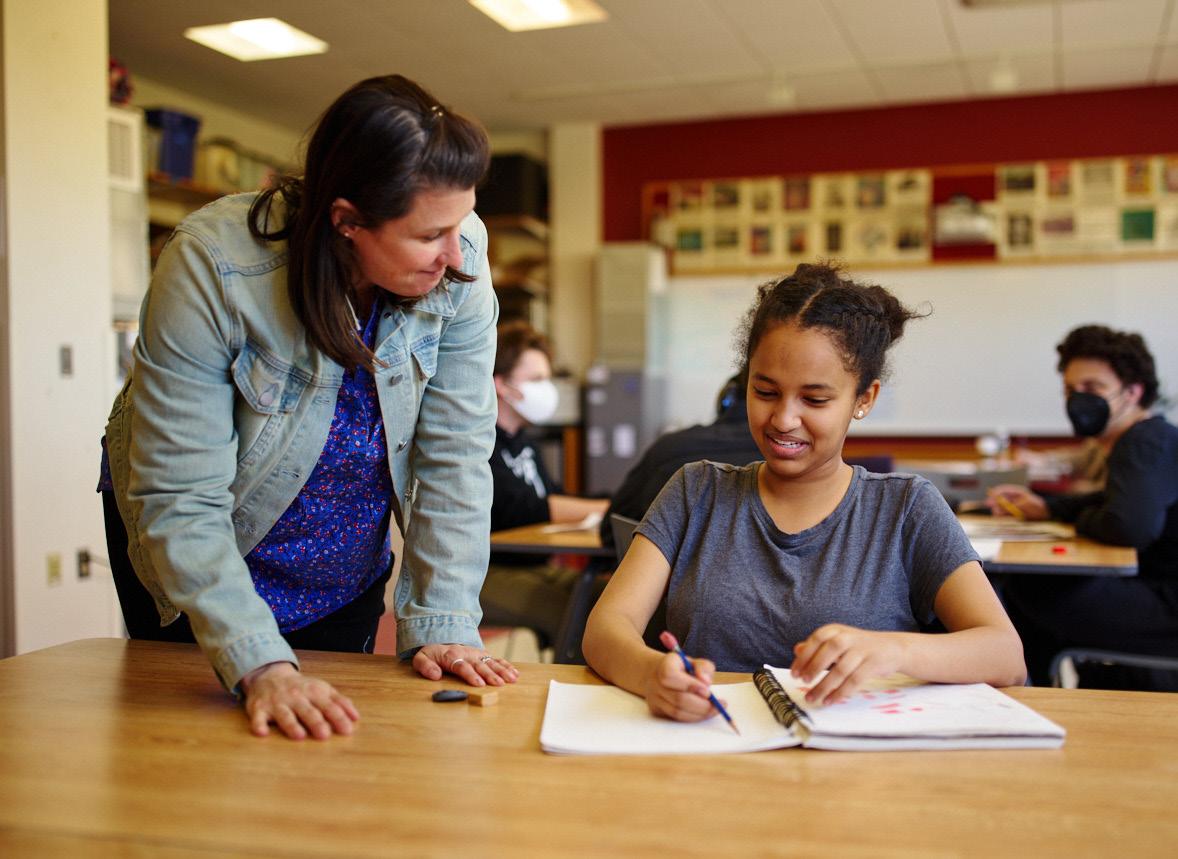
“He is a superb student. One of the best students I ever had at BU. He is bright and very studious. He acts as a leader and is a strong, positive influence on other students. He is always prepared and able to speak with authority or ask questions about assignments. Indeed, if I can put it this way, he is the kind of student one is delighted (and relieved!) to have in the classroom. Simply put, he sets a standard at which other students in the classroom could aim.”
BU ProfessorWe are grateful to the many alumni and parents/guardians who donated their time, energy, and expertise to help our school thrive.

Norm Blanchard P’16
Joanna Davidson P’24
Gerry Fine P’08
Njeri Grevious ‘13
Graham Healy-Day ‘07, Co-Chair
Jennifer Johnson ‘00
Katie Kozin ‘00
Shaheen Lakhani P’22
Ray Liu P’23, P’25
Alice Mitchell P’24
Bob Mulroy P’24
John Quackenbush P’24
Barbara Rotger P’13, P’17
Elizabeth Saltonstall P’22
Esmeralda Swartz P’22, P’24, Co-Chair
Mary Kalamaras and John Quackenbush P’24, Annual Fund Co-Chairs
Evelyn Encinas-Loncar P’24
Jing Chen P’24, P’24
Hilary Noel and Sean Noel, P’22
Shoma Haque P’25
Fiona Wang P’23
Savina Jaeger P’24, P’26
Mark Holman P’23
Karen Smirnakis P’23
Marvel Ang ‘06
Kenny Bacow ‘00
Isabelle Bertolozzi ‘14
Rebecca Carr ‘04
Samantha Cohen ‘08
Ben Daus ‘08
Dan Forward ‘05
Co-Chair
Njeri Grevious ‘13
Graham Healy-Day ‘07
Katie Kozin ‘00
Natan Magid ‘06
Alex Maloney ‘02
Josephine Massey ‘11
Hadassa Mikalixen ‘14
Abigail Walsh ‘04
Co-Chair





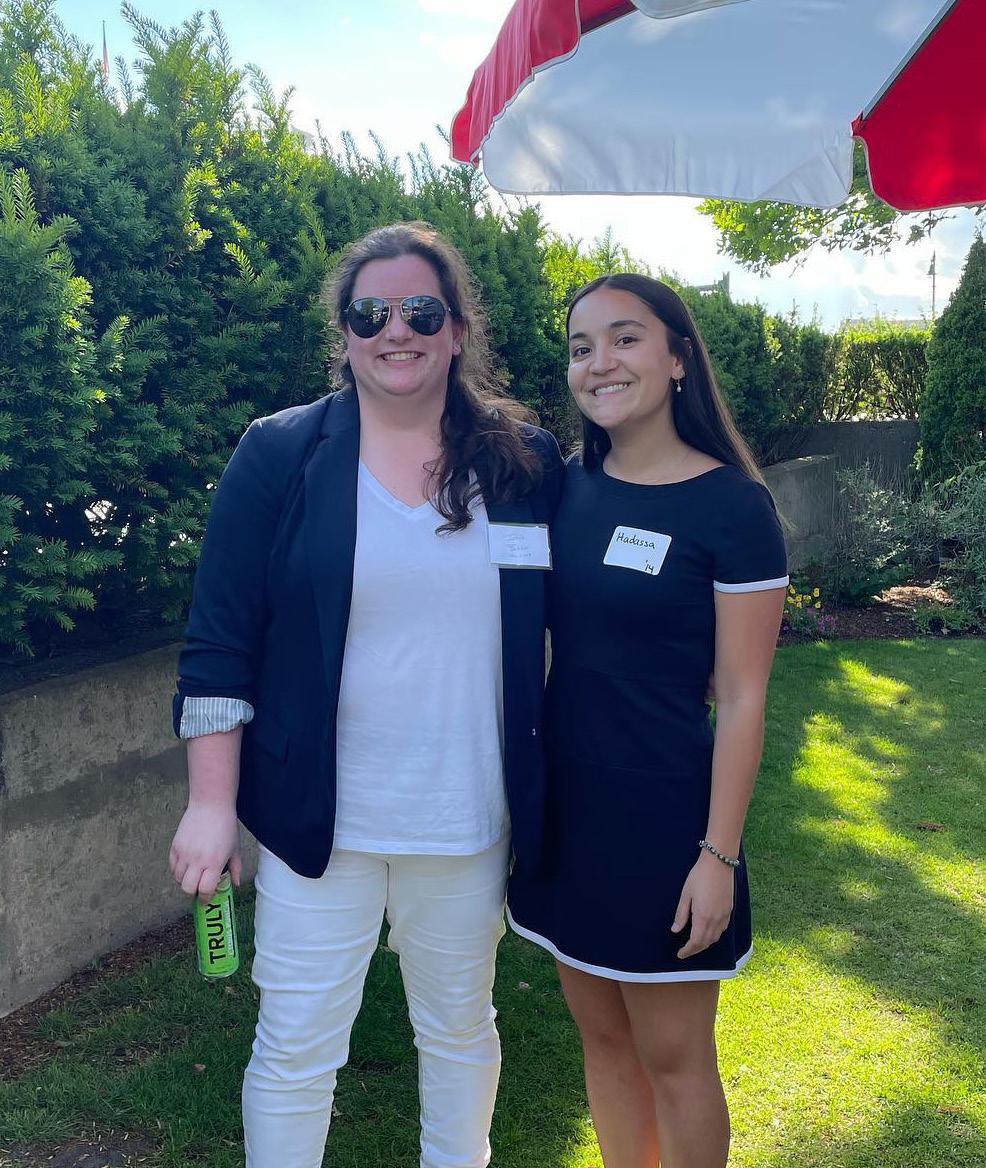

Dave Stone:
All right, let’s get this thing going. Welcome, Mr. Ligris. Let’s go back and refresh my memory of your family’s experience with BU. Your family seems to be very passionate and bleeds BU. Let’s start there.
Nik Ligris:
My father owned a business just down the street from the Academy, off of Comm. Ave. It’s called Stavros Cleaners and it’s still there. So my father just happened to be in the area. My older brother graduated high school at Newton South, and then matriculated to Boston University. And it was either his freshman or sophomore year where he read an article in the Daily Free Press about a new high school that had opened up on campus called BU Academy.
Come to find out, one of my father’s customers was a man named Peter Schweich, as was another man named John Silber. My father also did some contract dry cleaning for the University, band uniforms, for example. He would dry clean the band uniforms, he would do housing security uniforms, and then he got the contract for the Boston University Police Department. So I heard about the Academy from my brother. I knew nothing about the Academy until I came and I visited. I was an eighth grader.
DS:
And was that your own searches?
NL:
I got news for you. My parents could barely read English. So this was me and my brother — my brother steered me in the right direction, and then I kind of figured it out on my own. He was a public school kid and I was a public school kid K-8. I was always a good student… maybe a great student. But, you know, the Newton Public School system was big.
And I remember sitting in on a math class and saying to myself, ‘Wow, this place is cool.’ And listen, when you’re in eighth grade and you’re walking around a college campus, like, holy smokes, right? And I didn’t apply to any other private schools. And I remember getting my acceptance letter, which my mother still has on the wall at her house. And it was one of the best decisions I ever made.
DS:
Was your experience with your peers at BUA different from Newton, even though Newton’s a strong system?
NL:
Great schools, big school system. My father has passed away now, but the one thing I remember is that he had concerns about me being in a bigger school. So my father was for the Academy primarily because he knew it was a small school. I remember I visited this school — it must have been the fall of my eighth grade year — and my memories of the school were: it was small, it was clean. It was so different from public school.
Very different. I graduated with one of the smallest classes in the Academy’s history — there were 16 kids in our graduating class. I really found my tribe at BUA. Specifically, I just celebrated my 27-year anniversary with my business partner, Christos Viores ‘98. And Christos is my son’s godfather. You know, when my father passed away, Christos and I slept on the floor at the Beth Israel next to each other. My mother identifies Christos as her third son.
DS:
So, the experience here academically and socially, was it an automatic fit for you, or did you have to acclimate?
NL:
I’m a chameleon, right? It was also a very different time than it is now. We
“I remember getting my acceptance letter, which my mother still has on the wall at her house. And it was one of the best decisions I ever made.”TIONS DAVE STONE. NIK’S SON, STAVROS ‘25, IS THE FIRST LEGACY STUDENT IN BUA’S HISTORY.
didn’t have a ton of social experiences because the academics were challenging. The academics were rigorous and the first two years seemed to just fly by at the Academy. I mean, they just literally flew by, but it was also magical to be a part of something, you could tell you we were making history here.
DS:
How did the BUA experience — the education, those peers, the BU courses — shape you personally and professionally?
NL:
I got my bachelor’s degree from Boston University at the age of 19. What I realized quickly was you can study something that you enjoy studying. And I just remember going to school, excited to learn what I was learning.
I will tell you that the Academy taught me how to write; the Academy taught me how to read.
BUA’s mission from the beginning was a classical education to make students into scholars. I figured out that you should study something that you’re interested in. And I stressed that to my own son. I don’t think studying business or finance as an undergrad better prepares you for the business or entrepreneurial world. I think being a well-rounded human and your own academic, your own scholar, your own kind of person, is a better path.
The more you learn how to think, once you get it, you can take that to the next level and pop it into whatever field you end up in. Whether it’s finance, law,
medicine, you name it.
DS:
How did you initially land on BUA and decide was the right choice for Stavros (Class of 2025)?
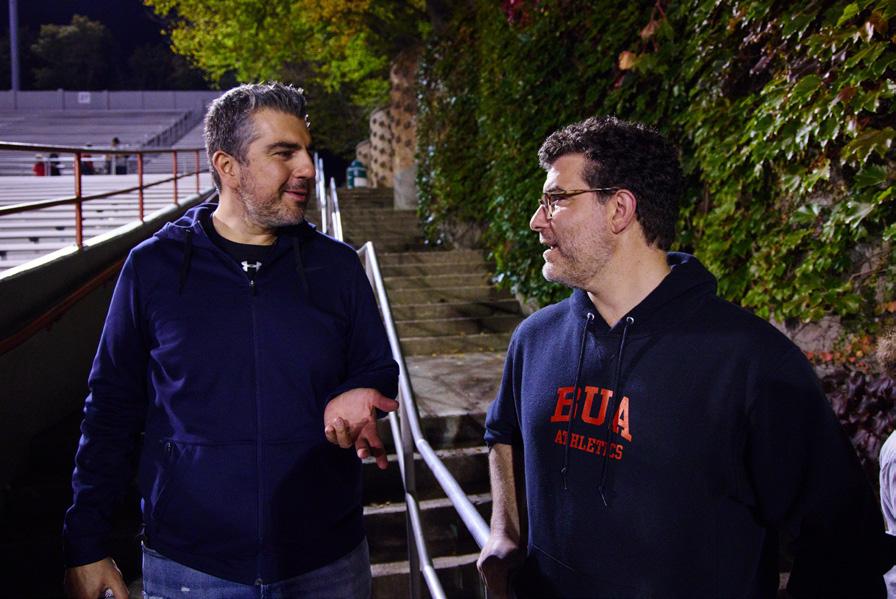
NL:
So, it’s funny. I remember the first time Stavros really came to anything, we had one of the alumni gatherings at the Castle. He was a baby, and he literally showed up as an infant in my arms. I had him when I was young. I took him everywhere. Like when it was the Turkey Bowl, he came along. I never talked to him about going to BUA, I never told him, ‘I want you to go to BUA.’ I never told him, ‘I want you to apply to BUA.’ He was exposed, and then, genuinely, I think it was you all at BUA. I think it was the info sessions. He just found his people here, but we never pushed him.

DS: Does Stavros ever describe the BUA environment?
NL:
Well, number one, he found his people. Academically, the fact that I see him up at 10, 11 o’clock at night working makes me smile. Maybe that’s bad of me to say, but it makes me smile. The fact that I see him caring, the fact that I see him annotating books and learning and trying, and then finding his people. You put it all together, and I think that, you know, it’s the perfect environment for him. And I just want to stress that I never forced it upon him. I never said, I want you to do this. And he actually spent the second half of eighth grade in Greece and we had a serious conver-
sation where I told him ‘if you want go to high school in Athens, I would love that.’ And he said to me ‘Dad, I want go to BUA.’
DS:
Being a parent at this school, you are respectful of the process and you’re pretty hands off.
NL:
Yeah. I’ve always been hands off. I didn’t have help growing up. My parents were immigrants who didn’t come to a single thing. At the Academy, I think they came to my graduation. I walked from the store here. I’d bum a ride from a midnight patrolman because my father had to start work at 5:30 in the morning. So the midnight guys would come drop off their clothes at 6:30, 7:00 a.m. And I’d be cognizant of when the building would open. And when it was cold, I’d bum a ride from a cop to get dropped off, to find my way here.
So I didn’t want to push, I didn’t want to supervise. I’d always ask the questions: have you done the homework, the reading, did you get in trouble today? The core questions. But I was never the parent in the helicopter.
So what I said to him is ‘I want you to enjoy high school. I want you to be a kid. I want you to go to a concert with your friends. I want you to do well in school, but if you get Bs and Cs, instead of all As, it’s not the end of the world, it’s not going to change you as a person. I want you to have those experiences.’ I just want him to be a good person and have a good high school experience.
DS:
How have things changed at BUA, from your perspective as an alum and as a parent?
NL:
Number one, there’s a lot more support. There’s clearly a lot more support today and there are ways that you can raise your hand and get help. No question. There’s more communication. I don’t think my parents ever got anything other than midterm grades and final grades. I don’t even think we had advisors back then.
The support system, the size of the school — all those things are different. I think that academically, we had a greater emphasis on the classics than they have now. And — I think this is a generational thing — but nobody cared about our emotions. We were just told, “memorize Chaucer.” And now I heard that they’re not memorizing Chaucer in the 10th grade. What?!
DS:
What has the biggest surprise been, having your son here versus what you knew of the school?
NL:
My biggest surprise didn’t pertain to the school per se, because I think I had a good pulse on the school. My biggest surprise was how much he enjoyed coming here. A little piece of me thought that he wanted to come here because of me. But man, to see a kid
want to learn every single day and want to study is just — it’s special.
DS:
How have you remained engaged with BUA friends, teachers, and tradition since you’ve graduated?
NL:
I still try to come every year to the Turkey Bowl if I’m in town. I try to donate every single year. I served as an alumni representative. I go to the reunions.
I’ve represented fellow Academy students when they bought and sold their own homes. I’ve represented teachers. I’ve done some pro bono work for people that were connected to the school that needed help. Whatever I can do to give back. In the future, I’d love to hire an Academy student [at my law firm], or at least help somebody intern and learn a little bit of law.
And the magical thing is, having been born and raised here, growing up when I mentioned to people, I went to a small private school in the city and then they would say ‘Where?’ naturally, and I’d say ‘Boston University Academy,’ and people would be like, ‘What is that? Where is that?’ And now I get, ‘What a school! Oh my God. I know so-and-so who went there.’ It’s amazing.
So I think the alums that are local should definitely be involved. And the alums that are distant should try to be involved. I will not be shocked if kids
from New York, from DC or California end up moving back here to have their kids go to school here.
DS:
I’d say it’s gonna happen.
NL:
At BUA, kids are different and there’s something culturally special about it. So for the alums out there that might be reading this, I think it’s important for you to realize that you were a part of something special, something magical that has changed, has evolved, has grown. Your kids, if they see that it is a good fit for them, could also be a part of something special.
Magdalena Slosar-Cheah ‘99, recipient of the Distinguished Alumnus/a Award
BUA’s Alumni Council is honored to present the inaugural Distinguished Alumnus/a Award to Magdalena Slosar-Cheah ’99. The award celebrates an alumnus/a of the school who best exemplifies BUA’s values and makes an impact on the community and world around them. Dr. Slosar-Cheah received her BA in physics from Yale and her MD from UMass Medical School. She is also pursuing her MA in the history of medicine at Johns Hopkins University. She currently serves as an infectious disease physician at UMass Memorial Medical Center and assistant professor of medicine at UMass Medical School. There she specializes in infectious diseases with clinical interests in hepatitis, HIV, and AIDS. During the pandemic, Dr. Slosar-Cheah managed the hospital COVID-19 team, shaped hospital policies, and treated COVID-19 patients. She lives in Shrewsbury with her husband and two young kids. We look forward to welcoming Magdalena to campus this year and celebrating her accordingly.

“So for the alums out there reading this, I think it’s important for you to realize that you were part of something special, something magical that has changed, has evolved, has grown.”
Hilary Lerner ‘03’s child is rocking our future BUAer t-shirt!

curity, which he is really enjoying. Dana is finishing her last year of pediatrics residency at Boston Children’s, and will be a chief resident there next year, then plans to continue on to hematology/oncology fellowship.
Aaron Schein ‘06 moved to Chicago in August to start at UChicago as an Assistant Professor in the Department of Statistics and the Data Science Institute.
Meredith Baskies ‘06 was promoted to senior group marketing manager responsible for fabric care, home care, and NOW body care (shampoo, body wash, hand soap, skin care), North America at IFF. She also became chief marketing officer of start-up Neatly Spiked — vodka seltzer infused with green tea.
Liam Norris ‘06 and his wife, Samantha, live in San Francisco. She is working as a nurse practitioner in the city’s veteran hospital. Liam is still working in Facebook’s (Meta) AI infrastructure on making privacy focused machine learning frameworks. Their son, Jackson, is almost a year and half and they enjoy biking him around the city.
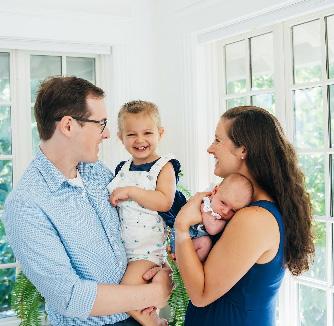
Dana Neel ‘07 welcomed Eleanor Joy (also known as Rory) in July. She joins big sister Charlie (3), who is reveling in the promotion and loves doting on “her” baby. Drew Macrae ‘07 continues his work at Google working on computer se-
2009
Anna Soltys Morse ‘09 started working with some folks in Montreal on an outdoor environmental show called “Branché,” which tours in New England and Québec. She would love to chat with members of the BUA community if they’re interested in the project!
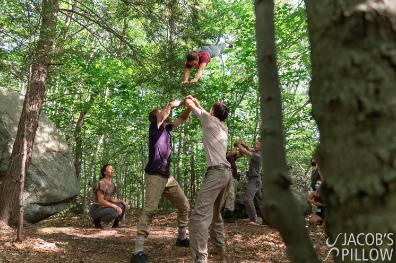
2010
Congratulations to Marshalle Grody ‘10 and her wife on their wedding earlier this year.
Will Maness ‘10 was married to Annie Maness over the summer. Can you spot the other BUAers in the photo?
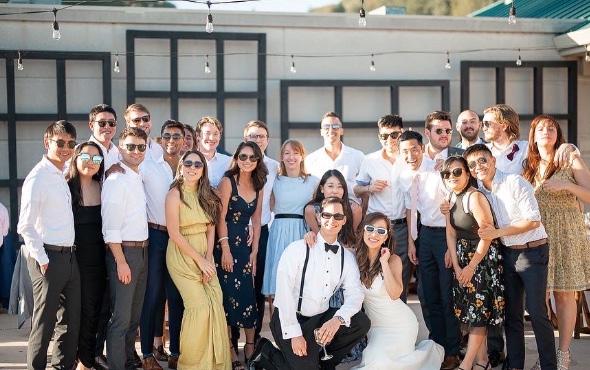
Michael Goldberg ‘09 moved to Salt Lake City to begin a dream postdoc position at the Eccles Institute of Human Genetics at the UofU! He will be studying broadly how DNA in cells from different tissues accumulates mutations as we age, and how that aging process varies between families.
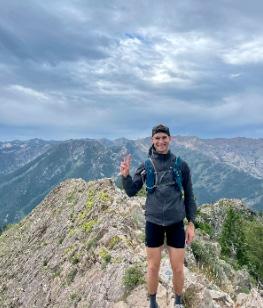
2012
Alessandra Davy-Falconi ‘12 had an essay published in “The Atlantic” discussing the attempt to find value in yourself when you’re primarily defined by the undervalued work you do.
2013
Ella Hathaway ‘13 started this fall as a Latin teacher at Dedham Country Day!
Congratulations
Bennett Vogt ‘13 is entering his final year of medical school at the University of Massachusetts Chan medical school. He is planning to apply to a residency in internal medicine and pediatrics somewhere in New England ideally. He’s happy to be back living in greater Boston after living in Central MA for the past three years! And he is still riding the Pan Mass Challenge with other BUA-ers!

Victor Kamenker ‘13 is a second-year MBA student at Harvard Business School. He is always happy to connect with BUAers contemplating B-school or with fellow alums in the real estate world.
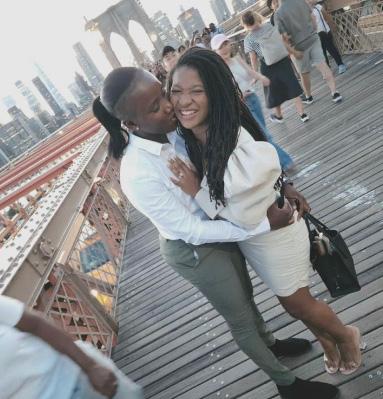

Adeline Um ‘15 signed to a London management company called Creative Sounds UK and also signed to a Bristol, UK publishing company/distributor called 3Tone Music. She is working on releasing singles every six weeks which will eventually compile into her upcoming EP “still blooming.” Adeline is also freelancing for a non-profit organization based in Edinburgh called Live Music Now Scotland which sends musicians out to hospitals, care homes, schools, and adult day centers for additional support needs. Lastly, she is working remotely as the label manager for an independent record label based in Italy called “Afterpeak Music Group.”
Stav Rones ‘17 (pictured with co-founders Nijel Hunt and Alex Jayyosi) launched Reach, an iOS application that enables users to discover exciting and personalized events happening in real time in their local area. Unlike other social platforms, the goal of Reach is to get you off your phone and back into the world. The app allows users to discover fun things to do, meet new people, and invest in their social life to create meaningful connections and experiences. Reach is publicly available on the iOS app store as “Reach: Discover Events” and can also be found through the company’s landing page: www.reachevents. social.

This year, BUA had the privilege of hosting Captain Lydia Hill ‘11 at an all-school meeting. Hill talked openly about mental health issues, LGBTQIA inclusion, and leading a life of service. She reflected on BUA as being “the first place I really saw people step up and be agents of change,” and shared her gratitude for a BUA teacher who inspired her “by living his life openly and with courage.” Captain Hill went on to build her own legacy, founding the Spectrum Alliance for LGBTQIA airmen at the US Air Force Academy. We are grateful to Captain Hill for her vulnerability and candor, and look forward to more alumni speakers in the future.
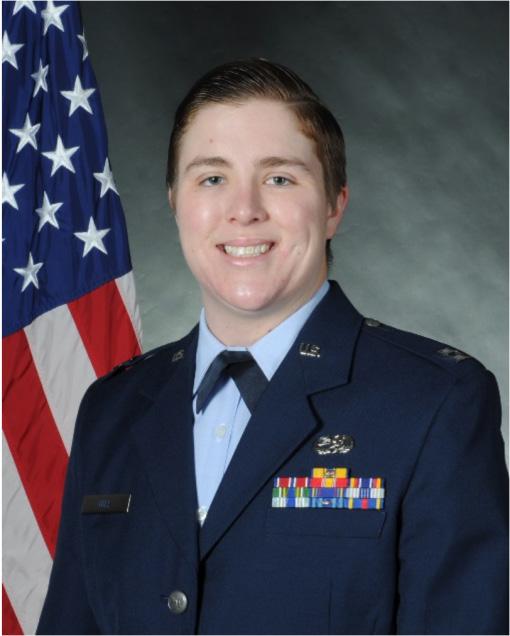

2020
Jean Lee ‘20 and Tanay Nambiar ‘22 met up at a conference at Princeton. At BUA, both Jean and Tanay were tour guides and studied piano under Mrs. Inga Magid, mother of Natan ‘06, Jake ‘09, Leah ‘13, and Benny ‘19.

2021
Olivia Chuang ‘21, Benista Owusu-Amo ‘21, Michaela McCormack ‘19, Natalie Huang ‘21, and Ava Landen ‘21 hung out together at the BUA spring reunion.



Have an update for the next BUA magazine? We’d love to hear from you! Send an email to Dave Stone at stoneyd@bu.edu
Stay up-to-date on all things BUA Alumni! Follow @bua_alumni on Instagram and Facebook


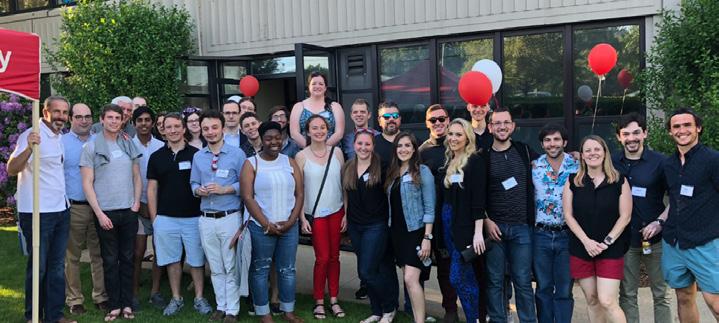
From panels to pub nights, we love having our alums back on campus!


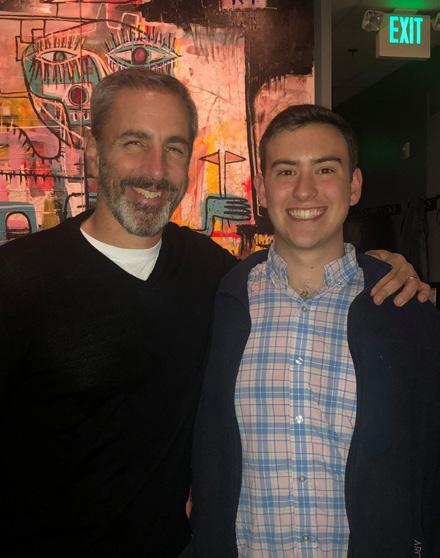

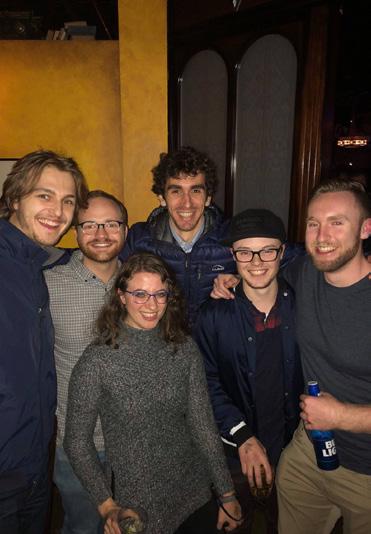






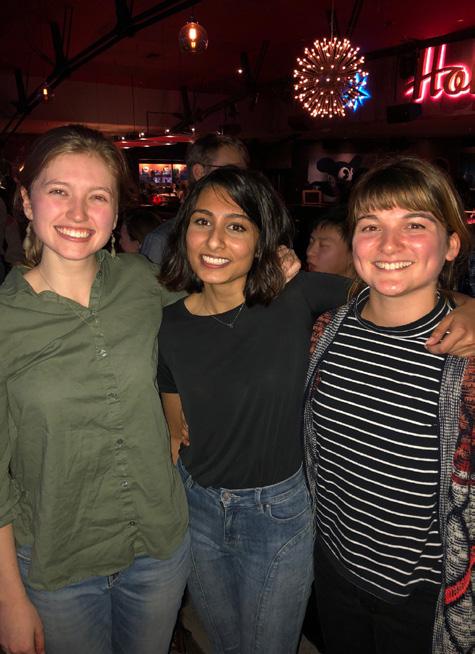



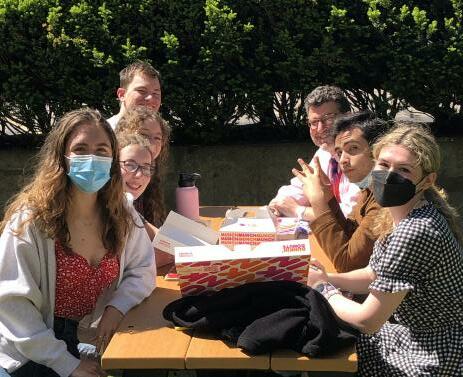
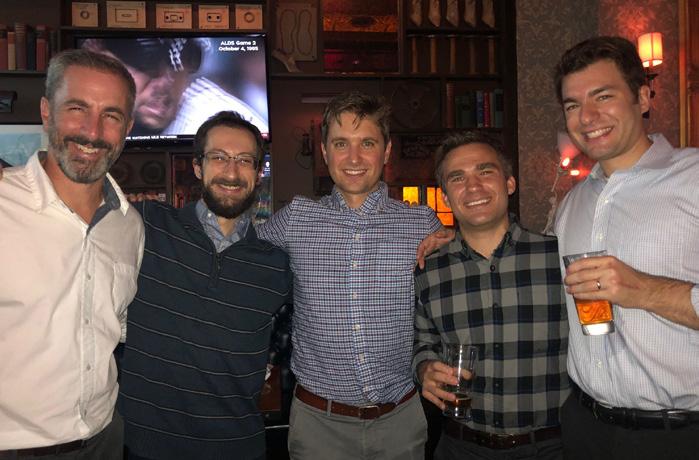
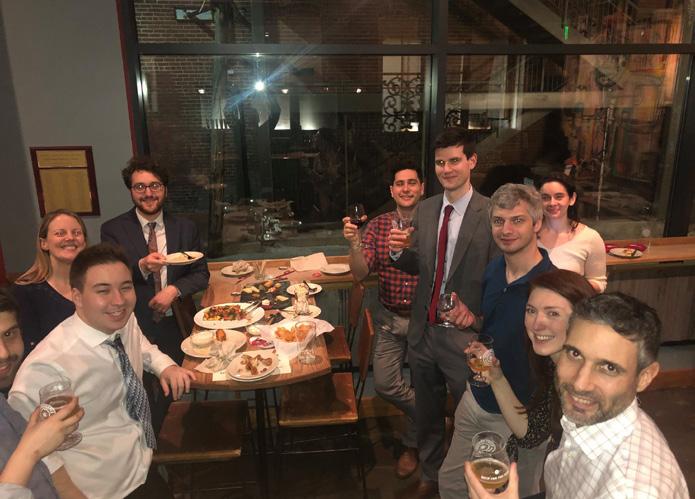
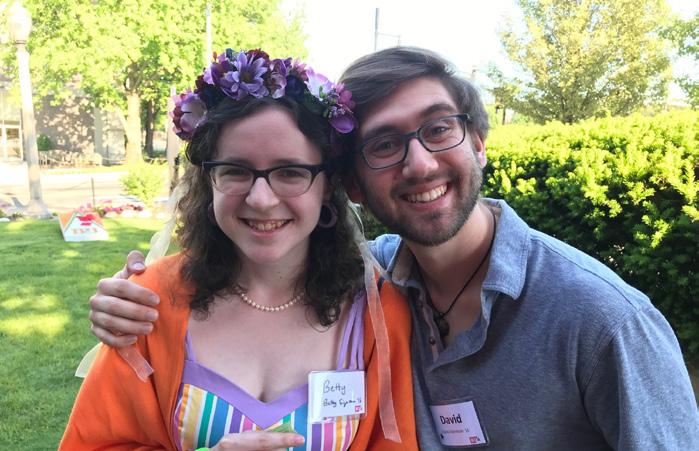

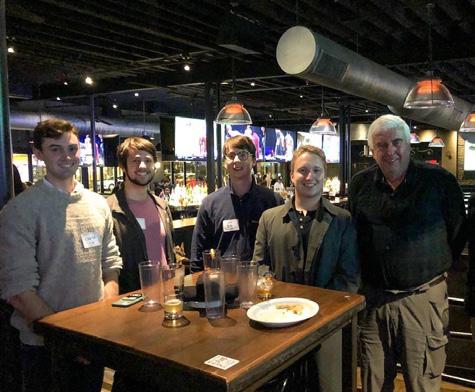
Boston University Academy English teacher Dr. Jennifer Formichelli passed away in a tragic accident near her home in Mattapan on the morning of October 26, 2022. Her loss was — and continues to be — profoundly felt.

Two days after her death, current and former BUA students and families, colleagues, friends, and family members gathered on BU’s Marsh Plaza to pay tribute to Jennifer. The glow of hundreds of flickering flames, reflected in the somber faces of the assembled crowd, was a testament to the impact Jennifer had on so many in our community.
Jennifer is remembered as a thoughtful, highly intellectual scholar of English literature; a champion of social justice, deeply committed to equity and inclusion in and out of the classroom; a trusted advisor; a warm and loyal colleague and friend; and, most of all, an engaged and dedicated teacher who loved her students.
Prior to joining BUA, Dr. Formichelli was a lecturer in BU’s Core Curriculum and the College of General Studies, and had recently completed a master’s in criminal justice at Metropolitan College. She held a BA in literary history from Boston University, and earned a PhD in English literature from the University of Cambridge.
Dr. Formichelli’s scholarly interests were broad and varied: she co-edited a volume of T.S. Eliot’s annotated prose, and authored published essays on James Baldwin, Shakespeare, and literary history, among other subjects. At the time of her death, she was writing an extensively-researched book about a quadruple homicide in Mattapan in 2010.
Through her work at BUA, Dr. Formichelli shaped the lives of hundreds of young people. In a tribute to Jennifer submitted through a remembrance page on the BUA website, one student wrote:
“Dr. Formichelli was the kind of teacher that wove joy and humor into her lessons in such an awe-inspiring way that students could not help but love her class. She was warm, unbelievably kind, compassionate, and empathetic. She impacted so many students in so many ways. I remember being a timid freshman walking into her class for the first time and feeling completely welcome, and this feeling returned every time I entered her room. I found my love of reading in her classroom. Her encouragement and acceptance shaped me into a better writer, better student, and, above all, a better person. She had a way of making each and every student feel seen, feel genuinely recognized for all of their accomplishments. She spoke with humility and sincerity, with a golden smile and the kindest eyes. Her generosity manifested itself in everything she did, from her kind words to students to her closet full of snacks, readily available to whoever wanted them. She taught me such important lessons in and out of the classroom, and I will forever cherish her.”
— BUA Student